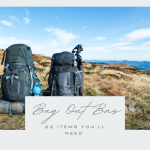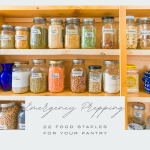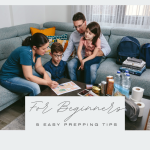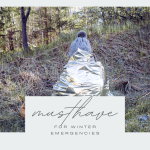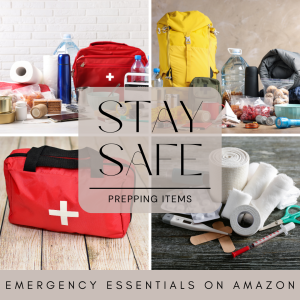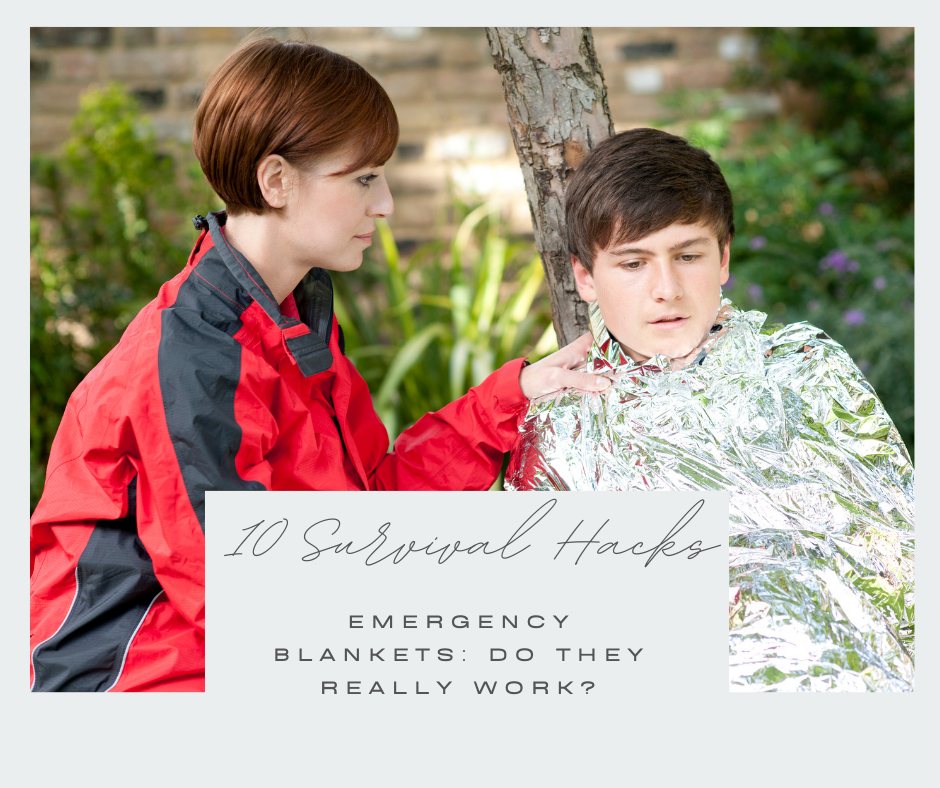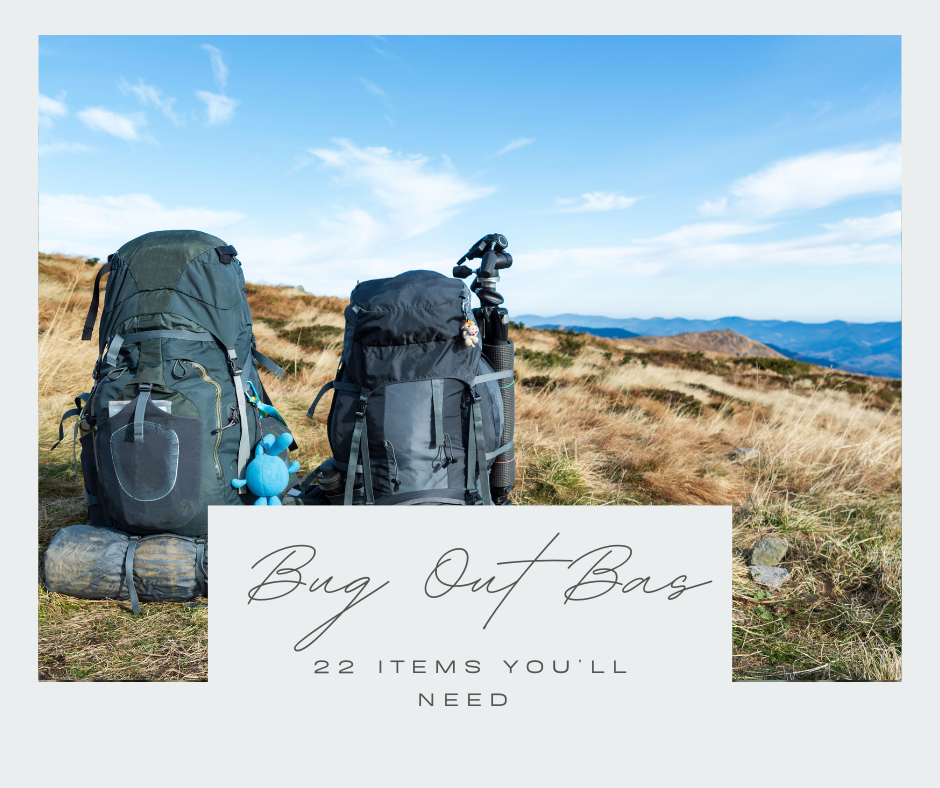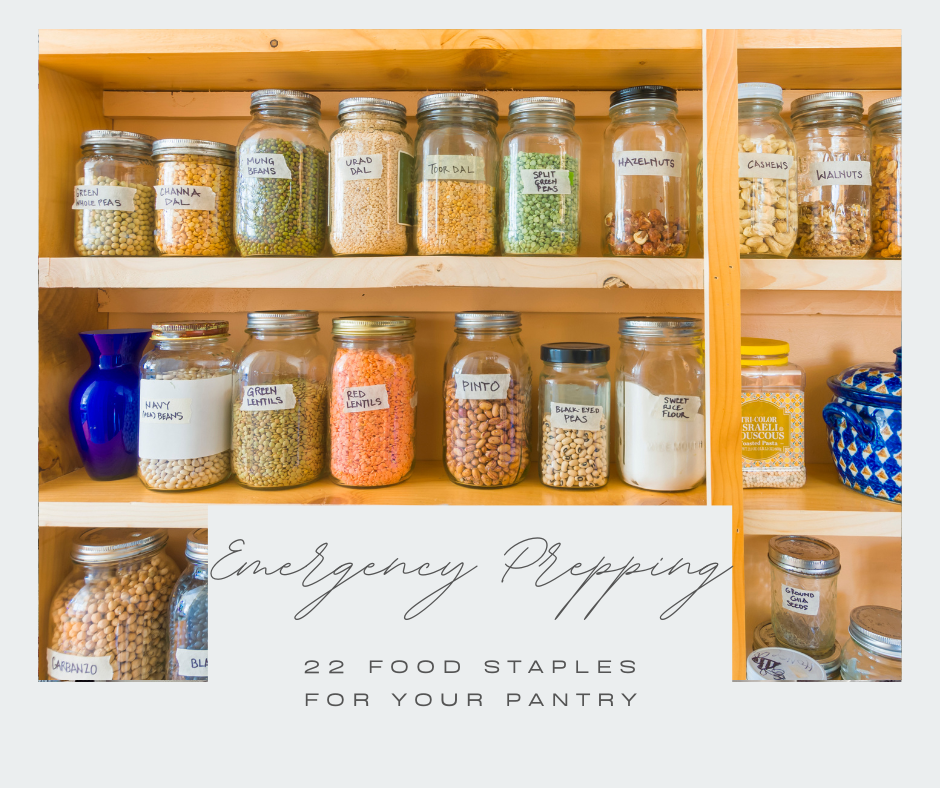Prepping Tips for Complete Beginners
If you’re a newbie prepper, these prepping tips for complete beginners are for you. Sometimes the thought of stockpiling food, water, and supplies can be intimidating and we all know that when we get overwhelmed it can be hard to start something new. But just like anything else in life, if you want to be prepared for an emergency, you have to start somewhere.
Today I’m going to share some prepping tips for complete beginners that will make the process a lot easier. You’ll learn why stockpiling is important, how to get started and what skills you need in order to prepare your family for an emergency.
Hi, I’m Erin, The Prepper Queen and I’m here today to help you feel more comfortable with the thought of starting to prepare for emergencies and help you learn how to do this the right way instead of going into debt storing food that could go bad or might never get eaten.
Prepping for Beginner’s on a Budget
Prepping is not just for people who have a ton of money. It’s not even just for super-serious survivalists with bunkers and guns and stuff. Prepping is something that anyone can do, no matter how much money they have or how serious they are about the whole thing. Learning how to do this on and budget and actually make it fun for you family to get involved is the goal.
Prepping Tips For Beginners Step 1:
The first step is to start stockpiling now. If you’re anything like me, you probably put off doing things like this because you don’t want to buy stuff until you know exactly what you need—but trust me, it’s better if you just get started now! You’ll learn as you go along what kinds of things your family uses most often, and then once those things are in stock, you can move on to stocking up on other things.
But what if there’s an emergency? What if all our food runs out or someone gets hurt or something happens at work? What if the government shuts down or aliens invade?! Don’t wait until it happens—prepare yourself right now so that when disaster strikes, at least one person in your family knows how to use their survival skills. I see a lot of people getting discouraged because their family isnt interested in prepping. Don’t let what you can’t control get you down. Start with the things and places you can control.
Welcome to the Club! You are among good company.
If you are brand new to prepping, I suggest starting with the would do is the rule of three. Three days of food, medicine, first aide. Then work on three weeks. Make sure you have your food, water, shelter or knowledge for shelter, gas for your car, medicine (first aide), back up heat.
Here’s a big prepping tip for complete beginners that you don’t want to miss (Step 2)
Do what you can. Your are learning and increasing your knowledge and skills. This is the first step that we all had to make. Here is what you truly need to focus on building
1)shelf stable food you will enjoy (and a way to make it, if power or gas are out) One of the first and most important aspects of prepping is ensuring you have a sufficient supply of shelf-stable food. This doesn’t mean stocking up on things you’ll never eat; it’s crucial to choose foods that you and your family enjoy and will be willing to eat, even in a crisis. Also, consider how you’ll prepare these foods if you don’t have access to power or gas. Think about alternative cooking methods such as solar ovens, camping stoves, or even wood fires. Building a diverse food supply that can be prepared under various conditions will not only keep you nourished but also bring a sense of normalcy in challenging times.
2) Keep few cases of water or water jugs (way to filter it if needed) Water is life, so having a reliable water supply is a non-negotiable aspect of prepping. Store a few cases of bottled water or invest in large water jugs to ensure you have enough to last for an extended period. However, it’s not just about storing water; it’s also about having the means to purify and filter water if you find yourself needing to source it from less reliable places. Learn about different water purification methods like boiling, chemical purifiers, and portable filtration systems. This knowledge could be invaluable in a situation where your stored water supply runs low.
3) Shelter (how are you going to heat your house if bugging in) Whether you plan to stay put (bugging in) or need to leave for a safer location (bugging out), having a plan for shelter is crucial. If you’re staying at home, think about how you will maintain a comfortable and safe environment, especially in extreme weather conditions. If you’re in a cold climate, consider how you will heat your house without conventional methods. This could mean having a wood-burning stove, or a supply of blankets and warm clothing. On the other hand, in a hot climate, think about ways to keep cool without air conditioning. Understanding your environment and preparing accordingly will ensure your safety and comfort
4) Security (how are you going to protect what you have) In a crisis, protecting yourself and your resources becomes a top priority. Consider how you will secure your home and belongings. This doesn’t necessarily mean turning your home into a fortress, but it does mean taking reasonable precautions. This could include reinforcing doors and windows, installing security systems, or even just having a plan for what to do in the event of a break-in. Additionally, think about personal safety and whether you need to learn self-defense or safe firearm handling. Remember, security is not just about physical barriers; it’s also about being aware of your surroundings and having a plan to respond to various scenarios.
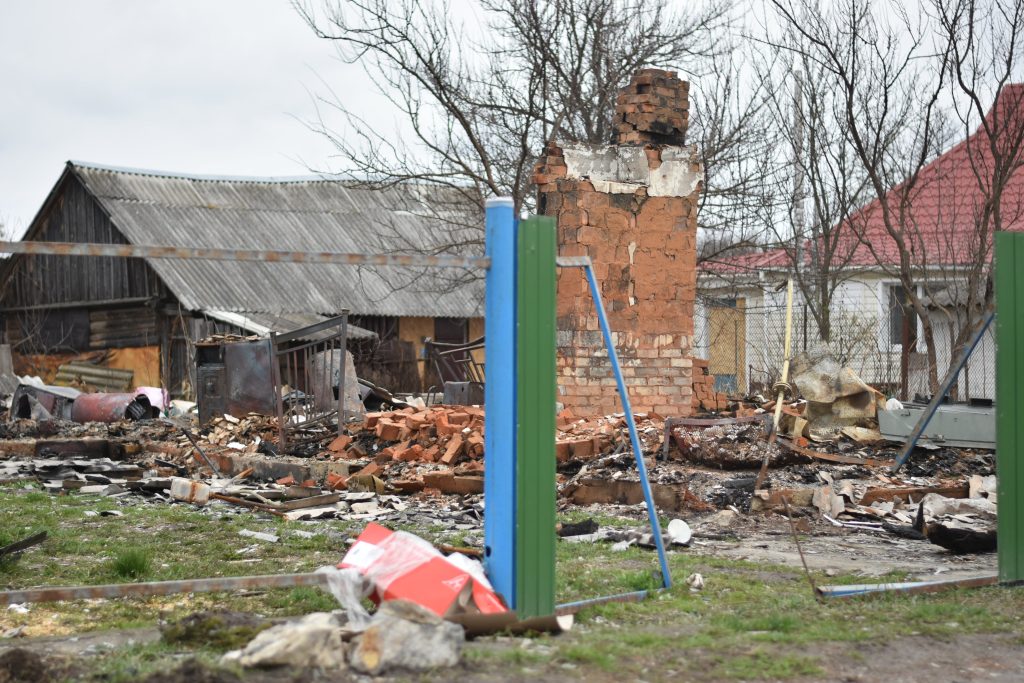
Prepping tips for Complete Beginners Step 3:
Make sure that you know how many people that you will be prepping for, I suggest using this food storage calculator to decide and determine how much food you will need for the amount of people you will be budgeting for.
https://ezprepping.com/food-storage-calculator/
This biggest piece of advice that I can give about this is not to go into debt! make sure that you buy from budget stores and also shop sales. You can create a list of categories for what you will be prepping for and then slowly build up your stockpile.
Everyone starts at the beginning. And we were all beginners. Keep compiling resources and knowledge, and a great first step is learning about these prepping tips for complete beginners. There’s many books that you can read on the subject and items you can find on Amazon to help you stock up on the essentials that you’ll need, these items might be a great place to start.
Creating a Plan for Your Kids Step 4:
Make sure that you do this at the beginning, as it usually doesn’t take too much time. Have a discussion with your partner and family members about how you will reach your children should a disaster situation occur. Make sure to speak with day care providers about their plan for possible events. Let them know your plans and what is and isn’t ok with you. Then take a hard look at what you would have to do get where your family would need to go! Take a look at this list of items you can find at the dollar tree to add to your car in case you have to leave in an emergency
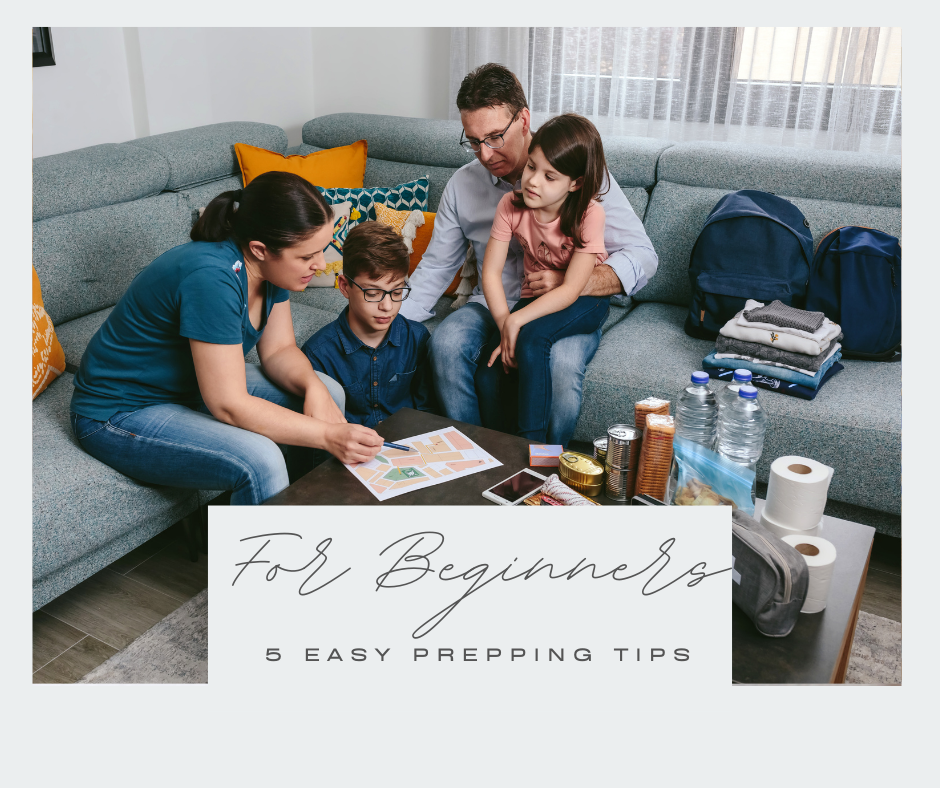
Prepping Tips for Complete Beginners Step 5:
Make sure that you like and will eat the food that you prep! I really cannot stress this enough. The easiest way to start is look at everything you use over the course of three weeks. Get yourself three weeks supply of food and goods so that you can hunker down in the event of the regional disaster or something.
How to Start: The easiest and most effective strategy to begin with is to closely monitor your eating habits over a three-week period. Take note of:
- What you eat: Pay attention to the types of foods you and your family consume regularly. Are they canned goods, dry goods, fresh produce, or a mix?
- How much you eat: Track the quantities. How many meals do you prepare each week? How many snacks do you consume?
- Preparation methods: Consider how these foods are cooked. Are you relying heavily on electricity or gas? Do you have alternatives if these utilities are not available?
Once you have a clear understanding of your dietary patterns, the next step is to build a three-week supply of these items. This timeframe is typically recommended because it’s long enough to cover most regional disasters or emergencies, yet short enough to ensure the food remains fresh and usable.
Selection Tips:
- Choose Long-lasting Variants: For perishables like milk or bread, look for longer-lasting alternatives, such as powdered milk or crackers.
- Consider Nutritional Balance: While it’s important to choose foods you like, also ensure that your storage includes a balance of proteins, carbohydrates, and fats, along with essential vitamins and minerals.
- Plan for Food Preparation: If your favorite meals require cooking, consider how you would prepare them if your usual utilities are unavailable. For instance, if you frequently eat pasta, make sure you have a way to boil water without electricity.
- Storage and Rotation: Proper storage of your food supply is vital. Keep your supplies in a cool, dry place to extend their shelf life. Additionally, practice rotation – use and replace these items regularly to ensure they don’t expire.
- Special Dietary Needs: If anyone in your family has specific dietary needs or restrictions, such as allergies or medical conditions, make sure to factor these into your planning.
- Comfort Foods: Don’t forget to include some comfort foods like chocolate, coffee, or your favorite snacks. These small luxuries can be a huge morale booster in tough situations.
Remember: The goal here is not just to survive a disaster, but to maintain a semblance of your normal life during it. Being well-prepared with a stockpile of food that you like and are accustomed to is a key step in achieving this. By closely mirroring your regular eating habits, your emergency food supply will feel less like a last resort and more like a well-prepared plan
After you get three weeks and you feel like you’re getting the hang of it go for three months. Combine that with starting your own stockpile, and if you are afraid of being separated from your children, make yourself a couple back up plans, and pack up a good get home bag.
As you start making little steps you’ll likely feel less fear and more purpose set in. All the best to you.
If you found these 5 prepping tips for complete beginners useful, please let us know in the comments, and let us know where you’re reading from! We love to get to know our readers.



